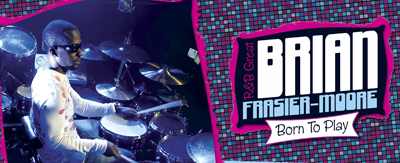Brian Frasier-Moore: Born to Play

by Robyn Flans
“I am not much impressed by drummers these days; I always end up preferring drum loops to live drummers. But when Brian plays, you pay attention.”–Madonna
Aaliyah, Ginuwine, Ciara, Janet Jackson, Patti LaBelle, Babyface, Justin Timberlake, Backstreet Boys, Christina Aguilera, Usher, and now Madonna–no doubt about it, Brian Frasier-Moore has carved out an amazing career. But it’s no surprise that the R&B great is in such demand. One listen to his exciting style and deep-soul groove–one that can rock stadiums, and regularly does–and you know why. Brian Frasier-Moore has a special gift.
Amazingly, Brian’s background almost defies the groove-oriented superstar gigs he’s so closely associated with. He was only five when he first began playing drums in the Philadelphia Pentecostal church where his dad was the pastor. Brian was chosen by default–no one else could play. So there he was, playing for the choir and every other church event imaginable. And growing up in a Christian household, there was little secular music played, so drumming influences were few and far between.
When pressed on the subject, Brian does recall John Patitucci’s On The Corner, a record that the drummer says was a life-changer, in that it introduced him when he was a teenager to the playing of his all-time favorite drummer, Vinnie Colaiuta. According to Brian, “After that, I got around to seeing what this whole drum world is all about.” Advertisement
With absolutely no formal training, Frasier-Moore is the answer to that often asked question, “Are you born with it or is it developed”? In this case, the answer is definitely “born.” Naturally, development followed–his church experience, all the time he spent listening to music, and, of course, all of the touring that he eventually did. Still, it’s impossible to avoid the conclusion that Brian Frasier-Moore is one of those rare talents who was simply meant to play the drums.
MD: Playing in church, how would you say you learned the concept of grooving?
Brian: A lot of people have different opinions about church drumming. Yes, we overplay in church, quite a bit. We overplay to the tenth power! [laughs] But we do learn how to groove.
We also learn how to play over the barlines without even knowing we’re doing it. We learn how to express ourselves in 6/8 when it’s a 4/4 groove. I would say that growing up in church teaches you how to play the groove, but especially how to play fusion. You really get to express yourself–in fact, that’s required. If you don’t express yourself, you get kicked off the drums. Advertisement
In the church, I grew up playing all over the song, from top to bottom, just showing all of my chops. By the end of a song I’d have played everything I knew. They thrive on that approach in that environment. It’s normal. If you were to go in there and lay down a regular groove, they’d be like, “What is that”?
MD: But if you took that approach into a recording studio, you’d get fired.
Brian: I’ve seen a lot of guys come from the church scene and struggle in the pro music world.
MD: How did you figure things out when you came out of that environment?
 Brian: When I first came out, I thought it was all about me. That’s about as honest as I can get. I thought, “I’ve got some chops, the world is seeing me now, I love it, I love it.” But that changed as soon as that next-level gig came around and musical directors said, “Okay, calm down and learn the music. We still want that kind of fire, but we don’t want you all over the place. Learn the music.”
Brian: When I first came out, I thought it was all about me. That’s about as honest as I can get. I thought, “I’ve got some chops, the world is seeing me now, I love it, I love it.” But that changed as soon as that next-level gig came around and musical directors said, “Okay, calm down and learn the music. We still want that kind of fire, but we don’t want you all over the place. Learn the music.”
My first big tour was with the Whitehead Brothers, whose father was from McFadden & Whitehead, who had had the hit “Ain’t No Stopping Us Now.” That was 1996.
MD: How did your parents feel about you playing in the secular world?
Brian: That was tough. My father was a pastor. The names I was working with weren’t really big enough for my parents to be proud of yet, so I went through quite a bit trying to pursue my career. They weren’t very happy that I left school after two years.
Advertisement
I’ll never forget being in London with The Whitehead Brothers on my first tour, opening for Blackstreet, and seeing Gerald Heyward on drums. At our first show, I thought I played great. We got off the stage, and I was so hyped up that nobody could tell me anything–I was the man! [laughs] Then Blackstreet came on, and right then I realized what it took to play a serious show. It was amazing. My mouth dropped to the floor. Gerald Heyward was one of the first guys I saw play who really inspired me to push myself to the next level.
MD: Can you talk about the difference between those two levels?
Brian: It’s about attention to detail–every detail. I’m going to listen to the hi-hat pattern on the recording, and then I’m going to listen to the bass lines, and then I’m going to listen to where the chord changes come in, and then I’m going to listen to the lead vocals, the background vocals, the dynamics, the shape of the tune, everything. It’s that attention to detail that takes you to the next level.


